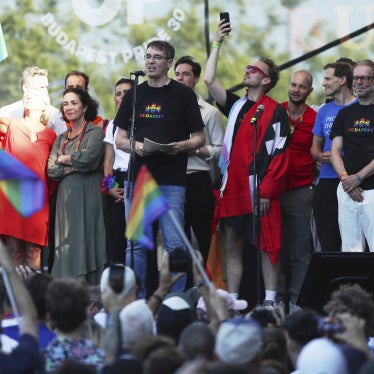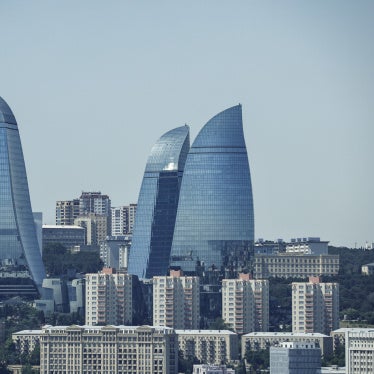(Berlin) – Serbia’s ban on the Belgrade Pride Parade, scheduled for October 6, 2012, violates the country’s international legal obligations and should be immediately repealed. On October 3, the Interior Ministry announced that based on an assessment of security risks, it was blocking the peaceful demonstration and all other public gatherings on the same date.
“The government of Serbia should protect the freedom of assembly and expression of the Serbian lesbian, gay, bisexual, and transgender (LGBT) community and their straight allies instead of forbidding them to assemble and march on the streets of Belgrade,” said Boris Dittrich, LGBT rights advocacy director. “Pointing to security risks without any visible effort to come up with a reasonable plan to make the Belgrade Pride Parade happen is succumbing to threats of violence. Basic human rights are being thrown overboard.”
The Serbian government also banned the Belgrade Pride Parade in 2011 on the basis that violent incidents took place during and after the 2010 parade, injuring policemen and participants. Earlier in 2012, Serbian courts convicted several people for inciting violence against LGBT people including during the 2009 and 2010 parades.
Serbia is a party to the European Convention on Human Rights and to the International Covenant on Civil and Political Rights. Both conventions guarantee the freedom of peaceful assembly and expression, and Serbia is obligated to secure their effective enjoyment. Serbian authorities therefore have a duty to take appropriate measures to safeguard peaceful gatherings and protect them from attempts to violently disrupt them. Prohibiting them in response to unlawful threats of violence is a failure to uphold these basic human rights obligations.
Serbia is also a candidate for membership in the European Union. In July the European Commission confirmed that respect for the rights of LGBT people forms part of the Copenhagen Criteria for accession to the European Union. The EU should apply that criterion when assessing Serbia’s candidacy.
On March 31, 2010, the Committee of Ministers of the Council of Europe unanimously adopted a set of recommendations to member states, including Serbia, on measures to combat discrimination on the grounds of sexual orientation and gender identity. The recommendations promote tolerance and respect for LGBT people. Member states are encouraged to take measures to prevent restrictions on the effective enjoyment of the rights to freedom of expression and peaceful assembly.
Chapter III of the Appendix to recommendation CM/Rec (2010)5 guarantees the freedom of expression and peaceful assembly. It reads:
14. Member states should take appropriate measures at national, regional and local levels to ensure that the right to freedom of peaceful assembly, as enshrined in Article 11 of the Convention, can be effectively enjoyed, without discrimination on grounds of sexual orientation or gender identity.
15. Member states should ensure that law-enforcement authorities take appropriate measures to protect participants in peaceful demonstrations in favor of the human rights of lesbian, gay, bisexual and transgender persons from any attempts to unlawfully disrupt or inhibit the effective enjoyment of their right to freedom of expression and peaceful assembly.
16. Member states should take appropriate measures to prevent restrictions on the effective enjoyment of the rights to freedom of expression and peaceful assembly resulting from the abuse of legal or administrative provisions, for example on grounds of public health, public morality and public order….
“The Serbian government should revoke its decision to ban the Belgrade Pride Parade and allow it to take place, while providing adequate security to all its participants,” Dittrich said.








